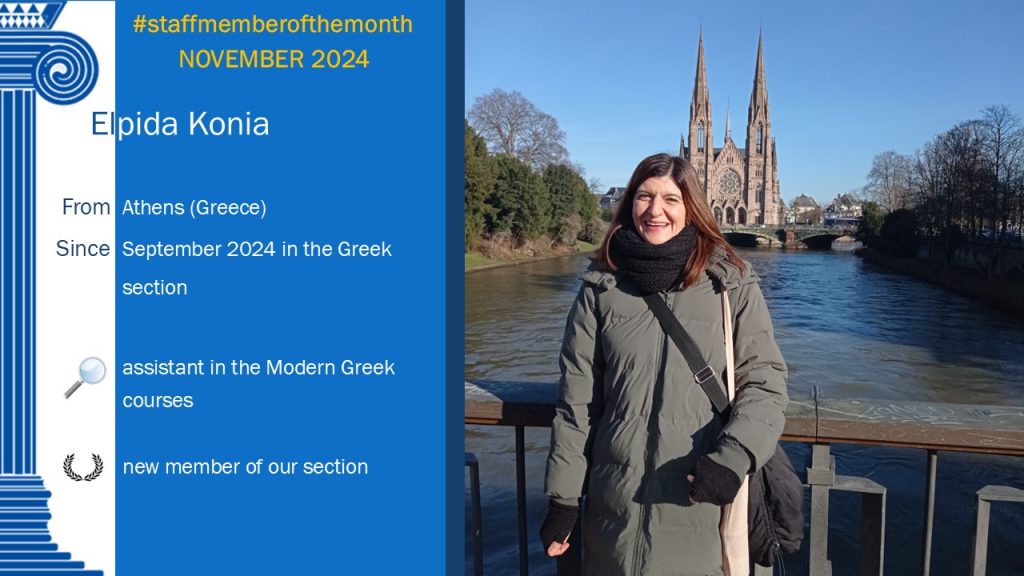The staff member of this month is Elpida Konia, who started working with us in September 2024, as an assistant in the Modern Greek courses. Elpida recently moved from Athens to Brussels as seconded teacher, paid by the Greek Ministry of Education. Katja De Herdt asked Elpida about her teaching experiences, her research on young adult literature and much more.

Hi Elpida! On Mondays you teach Ancient Greek and History to Greek teenagers at Kestekidio Hellenic School in Brussels, next day you’re working with Flemish students in Modern Greek. Which part of your job is most challenging?
Well, what I am actually experiencing is a demanding but fascinating teaching schedule. Maintaining student motivation can be a significant challenge in both contexts. Greek teenagers often feel disconnected from Ancient Greek texts because they are distant both in time and language. While Ancient Greek is part of their cultural heritage, they may not see its immediate relevance to their daily lives. As a result, maintaining my adolescent students’ interest in the subject can be difficult and requires insight and creativity. That said, while both parts of the job present unique challenges, teaching Modern Greek to Flemish students could be considered the most challenging because of the language barrier and the cultural distance between the students and the subject. However, an unexpected yet inspiring aspect of my current teaching experience is Flemish students’ prior knowledge of Ancient Greek and their keen interest in Greek culture which brings energy and vibrancy to our lessons.
You have been living in Brussels for 1,5 years now, after quite a few decades in Athens. You are passionate about Athens. Do you have the same πάθος with Brussels? How do you spend your weekends in our capital?
I am absolutely passionate about your capital. I chose to live in Brussels because of its reputation as the heart of Europe. Over the past year, I have experienced a city that is as welcoming as it is fascinating, blending historic elegance with modern vibrancy. I truly appreciate its contemporary, multicultural vibe, as well as the old buildings that tell stories of a rich past. Beyond the city, the beautiful Belgian countryside offers stunning landscapes and charming villages, perfect for peaceful escapes. On weekends, I often find myself exploring the lush parks, the bustling neighborhoods and the wonderful museums of the city. Moreover, one of the things I love most about my life in Brussels is that I’ve been able to incorporate jogging and cycling into my daily routine.
What I find quite surprising is that I often shiver while Belgians stroll comfortably in shorts or light jackets. It seems Belgians have a remarkable resilience to cold weather.
If you have to name one weird habit of Belgian people, what would it be? No worries, we can take it! Could you imagine living in Belgium for the rest of your life?
By all means, I can imagine living here for a long time. I have great admiration for the Belgian way of life, which embraces health and well-being—cycling through scenic routes, jogging in lush parks, or simply enjoying outdoor activities. However, since you asked, what I find quite surprising is that I often shiver while Belgians stroll comfortably in shorts or light jackets. It seems Belgians have a remarkable resilience to cold weather. I suppose this habit comes from a practical approach to the unpredictable climate and the sudden changes of the weather. I’ve even heard some locals joke that as long as the sun is out, it’s “warm enough,” no matter the actual temperature.
In 2016 you finished a PhD on Modern Greek Literature. Why did you choose this topic and what should we know about it?
My passion for the Greek language and culture has been a driving force throughout my academic journey. I have dedicated both my undergraduate and postgraduate studies to linguistics and philology, and I have developed a deep appreciation for the complexities and nuances of the Greek language. However, as my career progressed, my interests began to evolve in response to my experiences as a teacher in secondary education. While teaching adolescents, I became increasingly aware of the power of literature to engage young minds and influence their personal and intellectual growth. This realization sparked a new direction in my research, prompting me to explore the field of contemporary Greek young adult literature. While my initial academic focus had been on traditional linguistic and philological studies, I now found myself drawn to the narratives that resonate with younger audiences, exploring how these texts can be a means of both cultural expression and psychological exploration.
While teaching adolescents, I became increasingly aware of the power of literature to engage young minds and influence their personal and intellectual growth. This realization sparked a new direction in my research, prompting me to explore the field of contemporary Greek young adult literature.
On which days and where can we find you at Blandijn, to have a nice talk on Greek literature or biking in Flanders?
You can usually find me at Blandijn on Tuesdays and Fridays where I am either teaching or working on lesson plans. My (shared) office is 05.03.120.027 on the 2nd floor. I’d love to have a nice chat about Greek literature or share some biking tips in the region. Just let me know when you’re around, and we can grab a coffee and dive into whatever topic you’re most excited about—whether it’s discussing the beauty of Homer’s epics or the best cycling routes around Ghent! Looking forward to it!